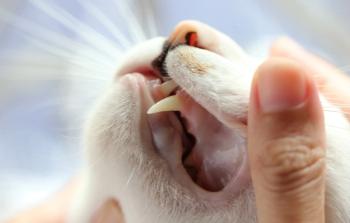
Using nutrition to support cancer patients

Nutritionist shares how to find the right food for patients diagnosed with cancer during her session at the Directions in Veterinary Medicine symposium in Nashville, TN
With a cancer diagnosis, a patient may experience symptoms that could lead to malnutrition including changes in metabolism, decreased appetite, lethargy, and weight loss, and in advanced stages, there can be a loss of body fat and lean muscle mass.1 Catherine Ruggiero, MS, DVM, DACVIM (Nutrition), manager of scientific communications at Hill’s Pet Nutrition, explained the extra care these cancer patients need when given nutritional support.
In her session at the Directions in Veterinary Medicine (DIVM) symposium in Nashville, Tennessee,2 Ruggiero stated, “Truly the only thing during chemotherapy that was statistically associated with quality of life was appetite. And that's pretty significant. That's something that you may see from your owners to when these [patients] stop eating, that's when you get called.”
Ruggiero used a study3 to showcase how important appetite is for clients. The study found that owners generally tolerate vomiting and hair loss, but do not tolerate inappetence, weight loss, and depression.3 “A state of malnutrition, obviously, is going to have a negative impact on pets with cancer. They are less likely to respond to treatment when they're undernourished, they stay in remission for a shorter period of time, and maybe most importantly, this is perceived as a reduced quality of life.”
She also described what these specific patients need to have a healthy and balanced diet while dealing with an oncologic disease. She suggested that a nutritional assessment should be performed as a baseline at the initial diagnosis of cancer. At each follow-up visit, reevaluate to detect changes in the pet’s condition, and if necessary, make adjustments in the nutritional plan.
Food options
During the DIVM session, sponsored by Hill’s Pet Nutrition, Ruggiero highlighted Hill’s new Prescription Diet Onc Care, a diet designed to feed and support pets with cancer. Nutritional supporting foods like Onc Care, Ruggiero explained work so that, “While those patients are fighting cancer, we need to support the rest of their body, we need to make sure that their quality of life remains high and that their appetite remains good.”
In general, the food selection should keep in mind the nutrients that these patients need including high calorie or high fat, protein, omega-3 fatty acids, and prebiotics. Ruggiero also explained that the texture and shape of the food can really matter with how appetizing it is for pets. She said, “Dogs like those big kibbles. They like crunchy, they like to chew and have that crunchy texture, but they don't want it to be hard. They want it to be a softer crunch. That is really different from a cat. Cats don't care as much about size, but they are very particular about shape. And some cats have some very strong shape preferences. Cats also really like something that is like a cracker consistency where they're going to bite down. And it's going to break.”
Client communication
Vicky Ograin, MBA, RVT, VTS (Nutrition), scientific communication specialist at Hill's Pet Nutrition gave explaination of how important client communication can be for nutrition. In a survey of people whose pets had cancer, 96% said they trusted their veterinarian’s advice regarding their pet’s healthcare and 79% indicated the same trust regarding nutritional advice. In the same survey, 100% believed nutrition played an important role in their pet’s health and 85% said they would purchase a conventional pet food that met their pet’s medical needs.4
References
- Nutritional support of pets with cancer. Hill’s Pet Nutrition. Accessed September 12, 2023. https://www.hillsvet.com/content/dam/cp-sites/hills/hills-vet/en_us/pdf/white-paper-nutritional-support-of-pets-with-cancer.pdf
- Ruggiero C. Nutritional support for pets with cancer. Presented at: Directions in Veterinary Medicine; Nashville, Tennessee; September 15-16, 2023.
- Williams J, Phillips C, Byrd HM. Factors which influence owners when deciding to use chemotherapy in terminally ill pets. Animals (Basel). 2017 Mar 7;7(3):18. doi: 10.3390/ani7030018. PMID: 28272340; PMCID: PMC5366837.
- Rajagopaul S, Parr JM, Woods JP, Pearl DL, Coe JB, Verbrugghe A. Owners' attitudes and practices regarding nutrition of dogs diagnosed with cancer presenting at a referral oncology service in Ontario, Canada. J Small Anim Pract. 2016;57(9):484-490. doi:10.1111/jsap.12526
Newsletter
From exam room tips to practice management insights, get trusted veterinary news delivered straight to your inbox—subscribe to dvm360.





